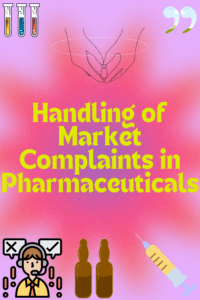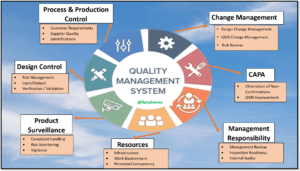The realm of pharmaceuticals encompasses a diverse landscape where market complaints hold significant importance. Effectively addressing these complaints requires a nuanced understanding of perplexity and burstiness, two crucial factors that shape the discourse within this industry.
Perplexity serves as a yardstick to measure the intricacy of textual content. In the context of market complaints in pharmaceuticals, it becomes crucial to navigate through complex issues while ensuring clarity and efficacy in the response. The multifaceted nature of these complaints demands an approach that embraces the nuances of the pharmaceutical landscape, allowing for comprehensive resolutions to consumer concerns.
On the other hand, burstiness highlights the variation in sentence structures and lengths, bringing a dynamic element to the discourse. Human communication often exhibits bursts of diverse linguistic expressions, alternating between longer, more intricate sentences and shorter, concise ones. Replicating this linguistic vibrancy within artificial intelligence writing requires skillful handling, interweaving a mix of sentence complexities and succinct articulations to emulate the authentic human touch.
Within the pharmaceutical industry, the harmonious interplay of perplexity and burstiness holds the key to effectively addressing market complaints. By striking a balance between intricate language structures and bursts of linguistic diversity, stakeholders can navigate the complexities of consumer grievances. The advent of advanced technologies presents an opportunity for pharmaceutical companies to infuse AI-driven discourse with the vibrant language found in human communication.
As we venture into a new era, the convergence of perplexity and burstiness opens doors for revolutionizing the handling of market complaints. By leveraging sophisticated textual analysis and embracing dynamic linguistic structures, the pharmaceutical industry can enhance its approach to consumer concerns. Acknowledging the significance of both perplexity and burstiness empowers stakeholders to foster improved communication, transparency, and ultimately, consumer satisfaction.
Market Complaints handling importance in Pharmaceuticals
In the dynamic landscape of the pharmaceutical industry, the proper handling of market complaints holds significant importance. Market complaints serve as a vital feedback mechanism, providing valuable insights into customer experiences, product quality, and regulatory compliance. Effectively addressing these complaints is not only crucial for ensuring customer satisfaction but also for maintaining the reputation and integrity of pharmaceutical companies.
Here are some key reasons why the handling of market complaints is of utmost importance in the pharmaceutical sector:

- Customer Satisfaction: Market complaints often stem from customer dissatisfaction with products or services. Promptly addressing and resolving these complaints demonstrates a commitment to customer-centricity, fostering trust and loyalty among consumers. By actively listening to customer concerns and taking appropriate action, pharmaceutical companies can enhance customer satisfaction and retain their valuable patronage.
- Product Quality Improvement: Market complaints provide valuable feedback on product quality issues, such as defects, adverse reactions, or packaging errors. Thoroughly investigating and analyzing these complaints can uncover underlying root causes, enabling companies to implement corrective and preventive actions. Continuous improvement in product quality based on market complaints helps ensure the delivery of safe, effective, and reliable pharmaceutical products.
- Regulatory Compliance: Regulatory bodies closely monitor market complaints as part of their oversight responsibilities. Timely and appropriate handling of complaints demonstrates compliance with regulatory requirements and demonstrates a commitment to patient safety. Effective complaint management helps companies maintain regulatory compliance, preventing potential penalties, reputational damage, or legal consequences.
- Risk Management: Market complaints often highlight potential risks associated with pharmaceutical products. By proactively addressing these complaints, companies can mitigate risks and prevent more significant issues, such as product recalls, safety alerts, or adverse events. Proper complaint handling enables early detection and intervention, reducing potential harm to patients and protecting the company’s interests.
- Continuous Improvement: Market complaints serve as a valuable source of feedback for process improvement and innovation. Analyzing patterns and trends in complaints can identify systemic issues, inefficiencies, or gaps in processes. Leveraging this feedback allows companies to enhance their operations, implement best practices, and drive continuous improvement across the organization.
- Reputation Management: The pharmaceutical industry operates in a highly competitive and scrutinized environment. Poor handling of market complaints can significantly impact a company’s reputation. On the other hand, effectively addressing complaints demonstrates professionalism, transparency, and a commitment to customer care. A positive reputation as a company that listens and takes action can foster trust among healthcare professionals, patients, and other stakeholders.
Critical Key Factors of the Market Complaints
| Key Factors | Description |
|---|---|
| Customer Feedback | Insights and concerns expressed by customers regarding products or services. |
| Product Quality | Issues related to product efficacy, safety, defects, or packaging errors. |
| Adverse Reactions | Reports of unexpected or undesirable effects experienced by consumers after product use. |
| Regulatory Compliance | Compliance with regulatory requirements and adherence to industry standards. |
| Timeliness | Prompt handling and resolution of market complaints to ensure customer satisfaction. |
| Root Cause Analysis | Identifying the underlying reasons or root causes behind the complaints to prevent future recurrences. |
| Risk Mitigation | Taking necessary actions to mitigate potential risks associated with the products or services. |
| Communication | Effective and transparent communication with customers, regulatory authorities, and other stakeholders. |
| Documentation | Proper recording and documentation of market complaints, investigations, and resolutions for reference and analysis. |
| Continuous Improvement | Utilizing market complaints as an opportunity for process enhancement and driving ongoing improvements in operations. |
Types of market complaints
In the pharmaceutical industry, market complaints can vary in nature and cover a wide range of issues. Here are some common types of market complaints that pharmaceutical companies may encounter:
- Adverse Drug Reactions (ADRs): Complaints related to adverse reactions or side effects experienced by individuals after using a pharmaceutical product. These complaints may involve symptoms such as allergic reactions, gastrointestinal problems, or other unexpected health issues.
- Product Quality Issues: Complaints regarding the quality of pharmaceutical products, including problems with appearance, taste, odor, texture, or packaging. This could include issues such as broken tablets, leaking containers, or contamination.
- Efficacy Concerns: Complaints where consumers or healthcare professionals express doubts about the effectiveness of a pharmaceutical product. This may involve claims that the product is not providing the desired therapeutic effect or that it is not performing as expected.
- Labeling and Packaging Errors: Complaints related to errors or inaccuracies in product labeling, such as incorrect dosage instructions, missing warnings, or unclear information. Packaging issues can involve problems with the readability or accessibility of important information.
- Availability and Supply Chain Problems: Complaints regarding product availability or supply chain issues, such as stockouts, delayed deliveries, or problems with distribution. These complaints can impact the accessibility and timely availability of medications to patients and healthcare providers.
- Counterfeit or Substandard Products: Complaints about the presence of counterfeit or substandard pharmaceutical products in the market. These complaints typically involve concerns about the safety, efficacy, or quality of the medication.
- Medication Errors: Complaints related to medication errors, including issues with prescribing, dispensing, or administering pharmaceutical products. This can encompass mistakes such as incorrect dosages, wrong medications, or confusion caused by similar product names or packaging.
- Customer Service and Communication: Complaints regarding poor customer service experiences, unresponsive communication, or lack of appropriate information from pharmaceutical companies. These complaints may involve delays in addressing concerns, inadequate support, or insufficient clarity in resolving issues.
- Pricing and Affordability: Complaints concerning the cost and affordability of pharmaceutical products. These complaints may involve concerns about high prices, lack of insurance coverage, or difficulties in accessing essential medications due to financial constraints.
- Regulatory Compliance: Complaints related to violations of regulatory requirements or guidelines. These can include issues with manufacturing practices, labeling non-compliance, inadequate safety measures, or failure to meet quality standards.
It’s important for pharmaceutical companies to address and investigate all market complaints promptly and take appropriate actions to ensure patient safety, product quality, and customer satisfaction.
Market complaints guidelines
| Guideline | Description |
|---|---|
| Receipt of Complaint | Establish a system to receive and record market complaints through various channels. |
| Documentation | Accurately document complaint details, including nature, product information, and contact details. |
| Initial Assessment | Conduct an initial assessment to determine the severity and potential impact on patient safety. |
| Investigation | Thoroughly investigate the complaint, gather relevant information, and collect supporting evidence. |
| Regulatory Reporting | Notify regulatory authorities within the specified timeframe for reportable complaints. |
| Corrective and Preventive Actions | Implement appropriate actions to address identified issues, including recalls or process modifications. |
| Communication | Maintain open communication with complainants, healthcare professionals, and regulatory authorities. |
| Documentation and Follow-up | Document all actions taken, including investigation findings and communication records. |
| Continuous Improvement | Utilize market complaints as feedback for ongoing quality management and process improvement. |
Standard Operating Procedure (SOP) for Handling Market Complaints in Pharmaceuticals:
The handling of market complaints in the pharmaceutical industry requires a systematic and efficient approach to ensure timely resolution and customer satisfaction. This Standard Operating Procedure (SOP) outlines the steps and guidelines to be followed when addressing market complaints in the pharmaceutical sector.
Objective:
The objective of this SOP is to provide a standardized framework for the handling of market complaints, promoting consistency, transparency, and effective resolution within the pharmaceutical company.
Scope:
This SOP applies to all departments involved in receiving, documenting, investigating, and resolving market complaints within the pharmaceutical organization.
Procedure:
- Complaint Intake:
- Designate a dedicated point of contact or department responsible for receiving mrket complaints.
- Establish a streamlined communication channel (e.g., dedicated email address, hotline) for customers to submit their complaints.
- Ensure prompt acknowledgment of receipt to the complainant.
- Documentation:
- Create a standardized complaint form or template to capture relevant information, including complainant details, product details, nature of the complaint, and any supporting documentation.
- Maintain a centralized complaint database or system to track and manage complaints efficiently.
- Assign a unique complaint identification number to each complaint for easy reference and tracking.
- Investigation:
- Assign qualified personnel or a cross-functional team to investigate the complaint thoroughly.
- Gather all necessary information related to the complaint, including batch/lot numbers, manufacturing and expiration dates, and any relevant product documentation.
- Conduct a root cause analysis to identify the underlying reasons for the complaint.
- If required, collaborate with other departments, such as quality control or regulatory affairs, to gather additional information or expertise.
- Resolution:
- Determine the appropriate course of action based on the investigation findings and the severity of the complaint.
- Communicate with the complainant promptly, providing updates on the investigation and proposed resolution.
- If necessary, initiate corrective and preventive actions (CAPAs) to address the root causes and prevent recurrence.
- Implement the agreed-upon resolution and ensure it is documented and tracked for future reference.
- Follow-up and Closure:
- Monitor the implementation of the resolution and verify its effectiveness.
- Conduct periodic reviews to identify any trends or recurring issues related to mrket complaints.
- Provide feedback and training to relevant departments to improve processes and prevent future complaints.
- Close the complaint file once the resolution has been successfully implemented and the complainant is satisfied.
- Recordkeeping and Reporting:
- Maintain accurate and detailed records of all mrket complaints, investigations, and resolutions.
- Generate periodic reports summarizing complaint trends, resolution timelines, and any actions taken.
- Share complaint-related information with relevant stakeholders, such as management, quality assurance, and regulatory authorities, as required.
Conclusion:
The implementation of this SOP for handling mrket complaints in the pharmaceutical industry ensures a systematic and standardized approach to addressing customer concerns. By following the outlined steps and guidelines, pharmaceutical companies can enhance customer satisfaction, improve product quality, and foster a culture of continuous improvement.
Worldwide guidelines for market complaints in pharmaceuticals
| Guideline | Description |
|---|---|
| United States (FDA) | – Adverse Event Reporting: Manufacturers must report adverse drug events to the FDA. |
| – MedWatch Program: Encourages healthcare professionals and consumers to report adverse events and product quality issues to the FDA. | |
| – Corrective and Preventive Actions: Implement measures to correct and prevent recurring product quality issues. | |
| European Union (EMA) | – Pharmacovigilance Reporting: Companies must report suspected adverse reactions to the EudraVigilance database. |
| – Good Pharmacovigilance Practices: Ensure compliance with guidelines for the detection, assessment, understanding, and prevention of ADRs. | |
| – Quality Defects Reporting: Manufacturers should report quality defects to the competent authority. | |
| Canada (Health Canada) | – Mandatory Problem Reporting: Manufacturers must report product quality issues and adverse drug reactions to Health Canada. |
| – Recalls and Safety Alerts: Take appropriate actions, such as recalls or safety alerts, to address safety concerns promptly. | |
| – Good Manufacturing Practices: Adhere to quality assurance and quality control measures in drug manufacturing. | |
| United Kingdom (MHRA) | – Yellow Card Scheme: Encourages reporting of suspected adverse drug reactions by healthcare professionals and consumers. |
| – Defective Medicines Reporting: Manufacturers should report defective medicines to the MHRA. | |
| – Recall Actions: Take necessary steps, including product recalls, to address safety or quality issues. | |
| Australia (TGA) | – Adverse Event Reporting: Mandatory reporting of adverse events to the Therapeutic Goods Administration (TGA). |
| – Medicine Recall Actions: Manufacturers should undertake recall actions if there is a risk to public health or safety. | |
| – Good Manufacturing Practice: Follow guidelines for ensuring product quality, safety, and efficacy. | |
| World Health Organization (WHO) | – Pharmacovigilance: Encourages member states to establish pharmacovigilance systems for monitoring and reporting adverse drug reactions. |
| – Quality Assurance: Emphasizes the need for good manufacturing practices and quality control measures in pharmaceutical manufacturing. | |
| International Council for Harmonisation (ICH) | – ICH E2D: Guidelines for post-approval safety data management, including the reporting of post-marketing adverse drug reactions. |
| – ICH Q10: Quality management systems for pharmaceutical manufacturing, including corrective and preventive actions. | |
| – ICH Q9: Risk management principles for ensuring product quality and patient safety. |
Frequently Asked Questions
What are market complaints in the pharmaceutical industry?
Answer: Mrket complaints refer to feedback, concerns, or issues raised by customers or stakeholders regarding pharmaceutical products or services.

Why are market complaints important in the pharmaceutical industry?
Answer: Mrket complaints provide valuable insights into customer experiences, product quality, and regulatory compliance, allowing companies to address concerns and improve their offerings.
What types of issues are commonly reported in market complaints?
Answer: Common issues reported in mrket complaints include product defects, adverse reactions, packaging errors, ineffective formulations, or issues with product availability.
How should pharmaceutical companies handle market complaints?
Answer: Pharmaceutical companies should have a standardized process in place to receive, document, investigate, and resolve mrket complaints promptly and effectively.
How does addressing market complaints contribute to customer satisfaction?
Answer: By addressing mrket complaints, pharmaceutical companies demonstrate their commitment to customer care, improve product quality, and enhance customer satisfaction.
What role does regulatory compliance play in the handling of market complaints?
Answer: Regulatory compliance ensures that mrket complaints are handled in accordance with industry regulations, promoting patient safety and maintaining compliance standards.
How can market complaints help improve product quality?
Answer: Mrket complaints provide valuable feedback on product quality issues, allowing companies to investigate, identify root causes, and implement corrective actions to improve their products.
What is the significance of conducting a root cause analysis for market complaints?
Answer: Root cause analysis helps identify underlying reasons behind mrket complaints, enabling companies to implement targeted solutions and prevent future occurrences.
How does effective handling of market complaints contribute to risk management?
Answer: By promptly addressing mrket complaints, pharmaceutical companies can mitigate risks associated with product quality, safety, and regulatory non-compliance.
What communication strategies should be employed when handling market complaints?
Answer: Effective communication involves acknowledging receipt of the complaint, providing regular updates to the complainant, and transparently conveying the resolution process.
How can pharmaceutical companies ensure timely resolution of market complaints?
Answer: Companies can establish clear timelines and escalation procedures to ensure market complaints are resolved promptly and to the satisfaction of the complainant.
What steps can be taken to prevent recurrence of market complaints?
Answer: Implementing corrective and preventive actions, conducting thorough investigations, and continuously monitoring product quality can help prevent recurrence of market complints.
How can market complaints be utilized for continuous improvement in pharmaceutical companies?
Answer: Analyzing patterns and trends in market complints can identify areas for process improvement, innovation, and enhancing customer satisfaction.
What is the importance of documentation in handling market complaints?
Answer: Documentation ensures proper record-keeping of market complints, investigations, and resolutions, allowing for analysis, trend identification, and regulatory reporting.
How can pharmaceutical companies use market complaints to enhance their reputation?
Answer: By proactively and effectively addressing market complints, companies demonstrate their commitment to customer satisfaction, regulatory compliance, and maintaining a positive reputation in the industry.


Wow, this article is nice, my sister is analyzing such things, thus I am going to tell her.